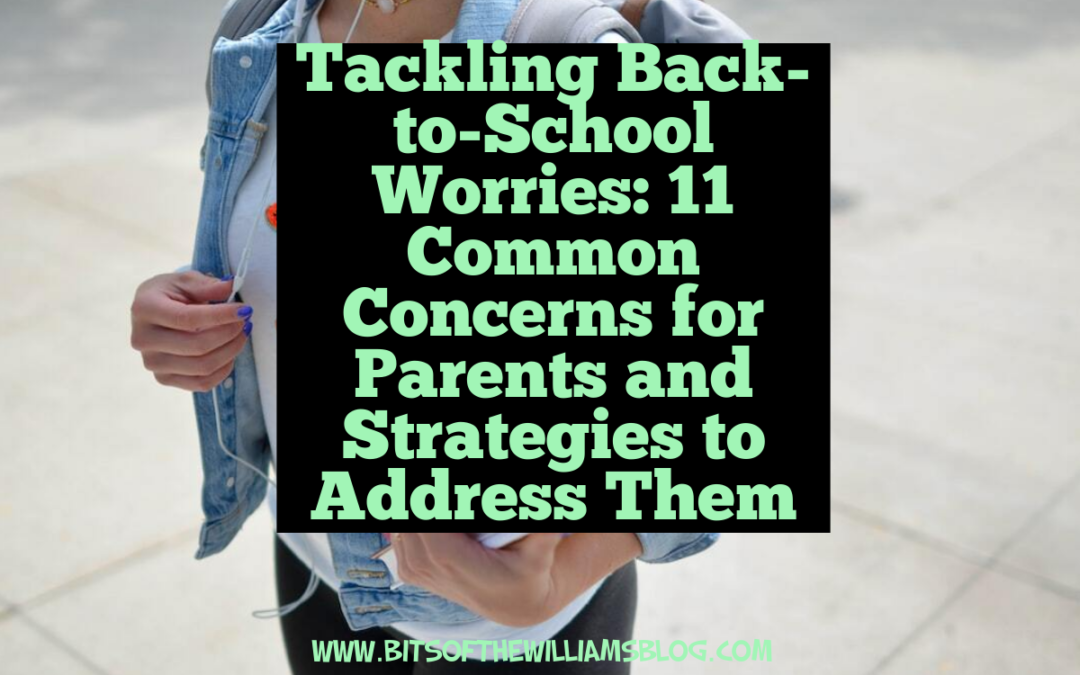This post may contain affiliate sales links.
As the start of the school year approaches, it’s natural for parents to have concerns and worries. From academic performance to social interactions, there are various aspects of their child’s schooling that can cause apprehension. However, by proactively addressing these concerns, parents can set a positive foundation for their child’s educational journey. In this blog post, we will explore 11 common worries parents might have about the start of school and provide strategies to tackle them effectively.
-
Academic Performance:
Concerns about a child’s academic performance are common. To address this worry, establish open lines of communication with teachers, attend parent-teacher conferences, and engage in regular discussions about your child’s progress. Encourage a positive attitude towards learning and offer support at home, such as creating a study routine and providing a quiet space for homework.
-
Bullying and Peer Pressure:
Worries about bullying and peer pressure can be unsettling. Foster open dialogue with your child about these topics, emphasizing the importance of assertiveness and empathy. Teach them to recognize signs of bullying, and encourage them to seek help from teachers or school counselors. Encourage your child to cultivate diverse friendships and engage in activities that build self-confidence and resilience.
-
Social Integration:
Starting a new school year can be intimidating for children, especially if they are transitioning to a different school or grade. Help your child build social skills by arranging playdates with classmates before the school year begins. Encourage involvement in extracurricular activities or clubs to facilitate connections with peers who share common interests.
-
Time Management and Organization:
The demands of schoolwork and extracurricular activities can cause concerns about time management and organization. Teach your child effective planning and organization skills, such as using a planner or digital calendar, breaking tasks into manageable steps, and prioritizing responsibilities. Encourage them to establish a routine that balances academic, extracurricular, and personal time.
-
School Safety:
Parents often worry about their child’s safety at school. Stay informed about the school’s safety protocols and emergency procedures. Establish open communication with school administrators and teachers regarding any specific concerns. Teach your child about personal safety, such as following rules, identifying trusted adults, and reporting any suspicious or uncomfortable situations.
-
Homework Overload:
The volume of homework can be overwhelming for both parents and children. Set up a designated homework area at home, free from distractions. Establish a consistent homework routine and teach your child effective time management strategies, such as breaking tasks into smaller chunks and prioritizing assignments. Encourage regular breaks and provide support when needed.
-
Peer Relationships:
Parents may worry about their child’s ability to form positive and healthy peer relationships. Encourage open conversations about friendship dynamics and guide your child on effective communication, conflict resolution, and empathy. Encourage them to participate in group activities or sports that foster teamwork and cooperation.
-
Standardized Testing:
Standardized testing can generate anxiety for parents and children alike. Keep the focus on learning and personal growth rather than solely on test scores. Help your child develop effective study strategies, offer encouragement, and provide a calm and supportive environment during the testing period.
-
Health and Wellness:
Concerns about your child’s physical and mental health are valid. Prioritize their well-being by ensuring they have a balanced diet, get enough sleep, and engage in regular physical activity. Foster open communication about their emotions and encourage them to seek help from trusted adults if needed. Stay connected with the school regarding any health-related concerns or accommodations.
-
Transition to a New School:
Moving to a new school can be a major worry for parents and children. Visit the new school together before the start of the year, meet teachers and administrators, and explore the campus. Connect with other parents and families in the new school community to ease the transition. Encourage your child to embrace the opportunity to make new friends and engage in new experiences.
-
Balancing Parental Involvement:
Finding the right balance between being involved in your child’s education and allowing them to become independent can be a concern. Support your child’s autonomy by gradually encouraging them to take responsibility for their own learning. Stay engaged by attending school events, volunteering when appropriate, and maintaining open lines of communication with teachers and school staff.
As parents, it’s natural to have concerns about various aspects of your child’s schooling. By addressing these worries proactively, you can support your child’s academic and emotional well-being. Foster open communication, establish routines, stay informed, and provide a supportive environment. Remember, your involvement and support play a significant role in helping your child navigate the challenges and joys of the school year. Embrace these strategies and watch as your worries gradually transform into confidence and pride in your child’s growth and development.


